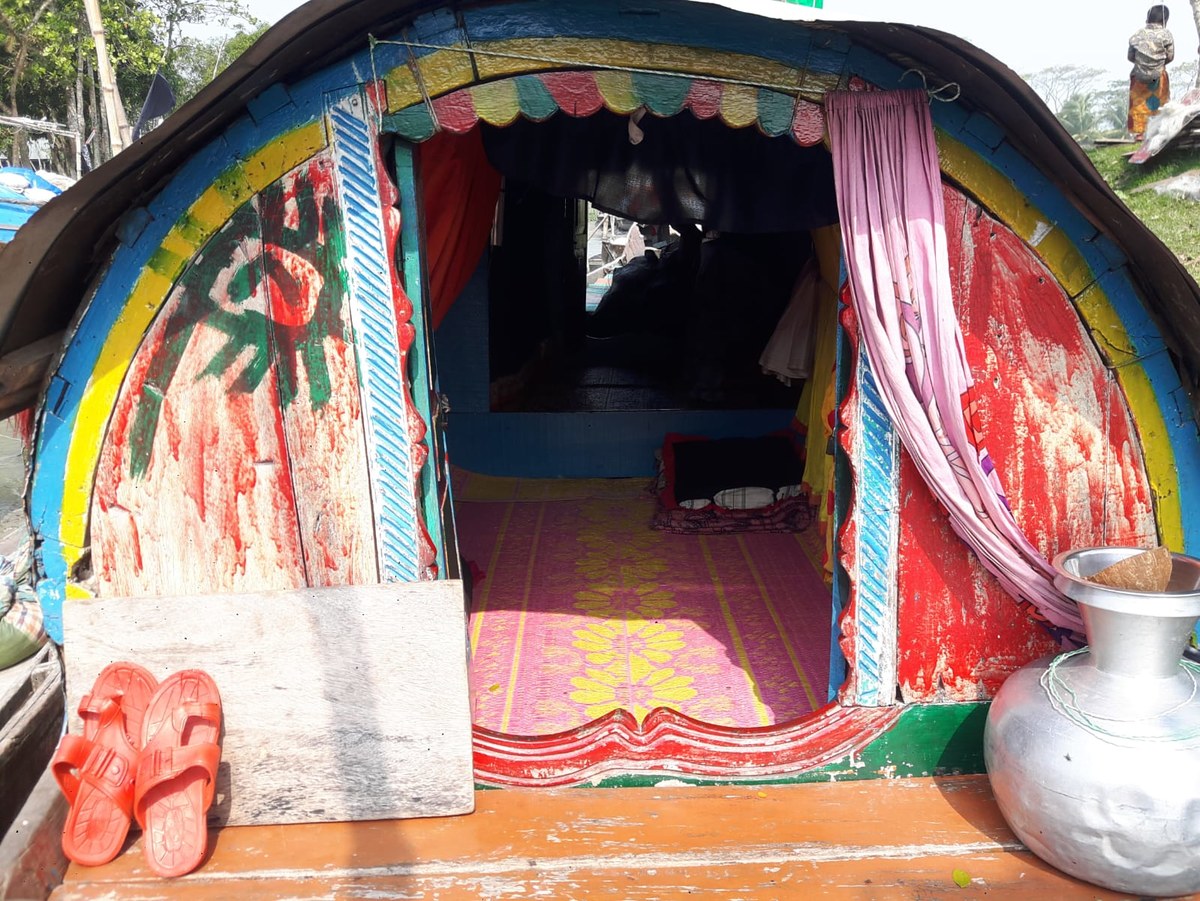DHAKA: When Abdur Rahman completed junior high school last month, it was no small achievement.
His parents and siblings had never gone to school; neither had anyone else in his family for as long as anyone could remember. And Rahman’s dream of finding a job on mainland Bangladesh was no small fantasy.
The 16-year-old boy comes from the Sardar community in Bangladesh’s southern Bhola region — a group that has been landless for at least a century and survives by living on wooden boats on the mighty Meghna River.
It is unclear how the group became landless but experts say they likely lost their homes to natural calamities such as cyclones or river erosion. Registered as Bangladeshi nationals only 20 years ago, the Sardar community now comprises 50 families, or some 200 people whose livelihoods depend solely on fish stocks from the Meghna River.

Boats belonging to landless fishermen are seen anchored in Bhola district, southern Bangladesh, in March 2019. (Photo credit: Zobaidur Rahman)
“Since I have been in school for 10 years, most of my friends are from nearby villages,” Rahman said, explaining his dream to chart out a life different from the one his family had for decades lived on the waters.
His eventual goal, he said, was to get a job on the mainland and become his community’s link to the outside world.
“Other children in my community don’t have too many friends among the people living on land,” Rahman said.
His mother, Kohinoor Begum, said it was the group’s migratory lifestyle that prevented them from attending school.
“Boys of our community start fishing with seniors from when they are teens and girls are also married off in their teens,” she said. “That’s why most of our children are deprived of education.”
But receiving an education and getting enrolment in schools is also difficult because of the stigma attached to the Sardar community.
Zobaidur Rahman, Bangladesh editor for The Third Pole environmentalist website, who has extensively researched the Sardar community, said members who tried to settle or work on the mainland were not accepted by local groups.
“They can’t send the children to school due to social taboo,” he told Arab News. “Mainland people don’t mix with these children, saying they carry the bad smell of fish.”
“Since these boat people don’t have any permanent address, they are deprived of many social safety net facilities offered by the government. The authorities may consider some special program to ensure the well-being of these boat people who are treated as a forbidden community by the mainland people.”

Boats belonging to landless fishermen are seen anchored in Bhola district, southern Bangladesh, in March 2019. (Photo credit: Zobaidur Rahman)
With little government assistance, the fishermen are largely self-reliant.
Community leader Shanu Sardar, 65, said he earned between $50 and $150 a month, depending on the catch. During four lean breeding months in Bhola each year, he said district authorities supported the group with food.
“Each family receives a package of rice, lentils, oil etc., to survive with the family during the days of non-fishing, but it’s very little,” Sardar said. “We need to buy everything from the market. We even have to purchase water.”
Community members own two kinds of boats: for fishing and to live in. Women even given birth on boats.
“Very rarely we visit the government-run district hospital,” Sardar said. “But our children receive vaccines for different diseases here at the boat as government health workers visit us.”
Officials have also visited with plans to offer settlement opportunities on land, locals said.
“The government has launched a nationwide housing project for homeless people. Local government representatives listed our names several times in this regard,” Sardar said. “But none of us received any home.”
To celebrate the 50th anniversary of its independence, Bangladesh launched a project this year to house all of the country’s homeless population, with more than 166,000 families expected to receive houses by February.
But authorities are unclear when the scheme would benefit the “floating fishermen.”
“We have a plan to provide them houses with land as the government-run housing project is underway,” Mizanur Rahman, a sub district chief executive, told Arab News last week. “But it depends on the availability of state-owned land in the nearby area. We are yet to find state-owned land in Dania Union where they are anchored.”












